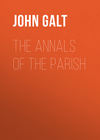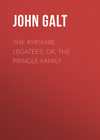Czytaj książkę: «The Entail», strona 4
CHAPTER IX
In the meantime, as much friendliness and intercourse was maintained between the families of Grippy and Plealands as could reasonably be expected from the characters and dispositions of the respective inmates. Shortly, however, after the conversation related in the preceding chapter had taken place, it happened that, as Malachi was returning on horseback from Glasgow, where he had lost a law-suit, long prosecuted with the most relentless pertinacity against one of his tenants, he was overtaken on the Mairns Moor by one of those sudden squalls and showers, which the genius of the place so often raises, no doubt purposely, to conceal from the weary traveller the dreariness of the view around, and being wetted into the skin, the cold which he caught in consequence, and the irritation of his mind, brought on a fever, that terminated fatally on the fifth day.
His funeral was conducted according to the fashion of the age; but the day appointed was raw, windy, and sleety; not, however, so much so as to prevent the friends of the deceased from flocking in from every quarter. The assemblage that arrived far transcended all that can be imagined, in these economical days, of the attendance requisite on any such occasion. The gentry were shown into the dining-room, and into every room that could be fitted up with planks and deals for their reception. The barn received the tenantry, and a vast multitude – the whole clanjamphry from all the neighbouring parishes – assembled on the green in front of the house.
The Laird in his lifetime maintained a rough and free hospitality; and, as his kindred and acquaintance expected, there was neither scant nor want at his burial. The profusion of the services of seed-cake and wine to the in-door guests was in the liberalest spirit of the time; and tobacco-pipes, shortbread, and brandy, unadulterated by any immersion of the gauger’s rod, were distributed, with unmeasured abundance, to those in the barn and on the green.
Mr. Kilfuddy, the parish minister, said grace to the gentry in the dining-room; and the elders, in like manner, performed a similar part in the other rooms. We are not sure if we may venture to assert that grace was said to the company out of doors. Mr. Taws, the dominie of Bodleton, has indeed repeatedly declared, that he did himself ask a blessing; but he has never produced any other evidence that was satisfactory to us. Indeed, what with the drinking, the blast, and the sleet, it was not reasonable to expect much attention would be paid to any prayer; and therefore we shall not insist very particularly on this point.
The Braehill church-yard was at a considerable distance from Plealands-house, and hearses not being then in fashion in that part of the country, one of the Laird’s own carts was drawn out, and the coffin placed on it for conveyance, while the services were going round the company. How it happened, whether owing to the neglect of Thomas Cabinet, the wright, who acted the part of undertaker, and who had, with all his men, more to attend to than he could well manage, in supplying the multitude with refreshments; or whether John Drappie, the old servant that was to drive the cart, had, like many others, got a service overmuch, we need not pause to inquire: – it, however, so happened, that, by some unaccountable and never explained circumstance, the whole body of the assembled guests arranged themselves in funereal array as well and as steadily as the generality of them could, and proceeded towards the church-yard – those in the van believing that the cart with the coffin was behind, and their followers in the rear committing a similar mistake, by supposing that it was before them in front. Thus both parties, in ignorance of the simple fact, that the coffin and cart were still standing at the house door, proceeded, with as much gravity and decorum as possible, to the church-yard gate, where they halted. As the gentlemen in front fell back to the right and left, to open an avenue for the body to be brought up, the omission was discovered, and also that there was no other way of performing the interment but by returning, as expeditiously as possible, to the house for the body.
By this time the weather, which had been all the morning cold and blustering, was become quite tempestuous. The wind raved in the trees and hedges – the sleet was almost thickened into a blinding snow, insomuch, that, when the company reached the house, the greater number of them were so chilled that they stood in need of another service, and another was of course handed round on the green; of which the greater number liberally and freely partaking, were soon rendered as little able to wrestle against the wind as when they originally set out. However, when the procession was formed a second time, Thomas Cabinet taking care to send the cart with the coffin on before, the whole moved again towards the church-yard, it is said, with a degree of less decorum than in their former procession. Nay, there is no disguising the fact, that more than two or three of the company, finding themselves, perhaps, unable to struggle against the blast, either lay down of their own voluntary accord on the road, or were blown over by the wind.
When the procession had a second time reached the church-yard, and Thomas Cabinet, perspiring at every pore, was wiping his bald head with his coat sleeve, his men got the coffin removed from the cart, and placed on the spokes, and the relatives, according to their respective degrees of propinquity, arranged themselves to carry it. The bearers, however, either by means of the headstones and the graves over which their path lay, or by some other cause, walked so unevenly, that those on the one side pushed against their corresponding kindred on the other, in such a manner, that the coffin was borne rollingly along for some time, but without any accident, till the relations on the right side gave a tremendous lurch, in which they drew the spokes out of the hands of the mourners on the left, and the whole pageant fell with a dreadful surge to the ground.
This accident, however, was soon rectified; the neighbours, who were not bearers, assisted the fallen to rise, and Thomas Cabinet, with his men, carried the coffin to its place of rest, and having laid it on the two planks which were stretched across the grave, assembled the nearest kin around, and gave the cords into their hands, that they might lower the Laird into his last bed. The betherel and his assistant then drew out the planks, and the sudden jerk of the coffin, when they were removed, gave such a tug to those who had hold of the cords, that it pulled them down, head foremost, into the grave after it. Fortunately, however, none were buried but the body; for, by dint of the best assistance available on the spot, the living were raised, and thereby enabled to return to their respective homes, all as jocose and as happy as possible.
CHAPTER X
On examining the Laird’s papers after the funeral, Mr. Keelevin, the father of the celebrated town-clerk of Gudetoun, the lawyer present on the occasion, discovered, in reading over the deed which had been executed by the deceased, in favour of Walter, the second son of Claud, that it was, in some essential points, imperfect as a deed of entail, though in other respects valid as a testamentary conveyance. The opinion of counsel, as in all similar cases, was in consequence forthwith taken; and the suspicions of Mr. Keelevin being confirmed, Walter was admitted as heir to the estate, but found under no legal obligation to assume his grandfather’s name, – the very obligation which the old gentleman had been most solicitous to impose upon him.
How it happened that the clause respecting so important a point should have been so inaccurately framed, remains for those gentlemen of the law, who commit such inadvertencies, to explain. The discovery had the effect of inducing Claud to apply to our old master, the late Gilbert Omit, writer, to examine the entail of the Grippy, which he had himself drawn up; and it too was found defective, and easily to be set aside. Really, when one considers how much some lawyers profit by their own mistakes, one might almost be tempted to do them the injustice to suspect that they now and then have an eye to futurity, and carve out work for themselves. There have, however, been discoveries of legal errors, which have occasioned more distress than this one; for, instead of giving the old man any uneasiness, he expressed the most perfect satisfaction on being informed, in answer to a plain question on the subject, that it was still in his power to disinherit his first-born. Well do we recollect the scene, being seated at the time on the opposite side of Mr. Omit’s desk, copying a codicil which Miss Christiana Heritage, then in her ninety-second year, was adding to her will, for the purpose of devising, as heir-looms, the bedstead and blankets in which Prince Charles Edward slept, when he passed the night in her house, after having levied that contribution on the loyal and godly city of Glasgow, for which the magistrates and council were afterwards so laudably indemnified by Parliament. We were not then quite so well versed in the secrets of human nature as experience has since so mournfully taught us, and the words of Claud at the time sounded strangely and harshly in our ear, especially when he inquired, with a sharp, and as it were a greedy voice, whether it was practicable to get Walter to conjoin with him in a deed that would unite his inheritance of Plealands to the Grippy, and thereby make a property as broad and good as the ancestral estate of Kittlestonheugh?
‘Ye ken, Mr. Omit,’ said he, ‘how I was defrauded, as a bodie may say, of my patrimony, by my grandfather; and now, since it has pleased Providence to put it in my power, by joining the heritage of Plealands and Grippy, to renew my ancestry, I would fain mak a settlement with Watty to that effek.’
Mr. Omit, with all that calm and methodical manner which a long experience of those devices of the heart, to which lawyers in good practice, if at all men of observation, generally attain, replied, —
‘Nothing can be done in that way while Walter is under age. But certainly, when the lad comes to majority, if he be then so inclined, there is no legal impediment in the way of such an arrangement; the matter, however, would require to be well considered, for it would be an unco-like thing to hear of a man cutting off his first-born for no fault, but only because he could constitute a larger inheritance by giving a preference to his second.’
Whatever impression this admonitory remark made on the mind of Claud at the moment, nothing further took place at that time; but he thoughtfully gathered his papers together, and, tying them up with a string, walked away from the office, and returned to Grippy, where he was not a little surprised to see Mr. Allan Dreghorn’s wooden coach at the door; the first four-wheeled gentleman’s carriage started in Glasgow, and which, according to the praiseworthy history of Bailie Cleland, was made by Mr. Dreghorn’s own workmen, he being a timber merchant, carpenter, and joiner. It was borrowed for the day by Mr. and Mrs. Kilfuddy, who were then in Glasgow, and who, in consequence of their parochial connexion with the Plealands family, had deemed it right and proper to pay the Leddy of Grippy a visit of sympathy and condolence, on account of the loss she had sustained in her father.
CHAPTER XI
The Reverend Mr. Kilfuddy was a little, short, erect, sharp-looking, brisk-tempered personage, with a red nose, a white powdered wig, and a large cocked hat. His lady was an ample, demure, and solemn matron, who, in all her gestures, showed the most perfect consciousness of enjoying the supreme dignity of a minister’s wife in a country parish.
According to the Scottish etiquette of that period, she was dressed for the occasion in mourning; but the day being bleak and cold, she had assumed her winter mantle of green satin, lined with grey rabbit skin, and her hands ceremoniously protruded through the loop-holes, formed for that purpose, reposed in full consequentiality within the embraces of each other, in a large black satin muff of her own making, adorned with a bunch of flowers in needlework, which she had embroidered some thirty years before, as the last and most perfect specimen of all her accomplishments. But, although they were not so like the blooming progeny of Flora, as a Linwood might, perhaps, have worked, they possessed a very competent degree of resemblance to the flowers they were intended to represent, insomuch that there was really no great risk of mistaking the roses for lilies. And here we cannot refrain from ingeniously suspecting that the limner who designed those celebrated emblematic pictures of the months which adorned the drawing-room of the Craiglands, and on which the far-famed Miss Mysie Cunningham set so great a value, must have had the image of Mrs. Kilfuddy in his mind’s eye, when he delineated the matronly representative of November.
The minister, after inquiring with a proper degree of sympathetic pathos into the state of the mourner’s health, piously observed, ‘That nothing is so uncertain as the things of time. This dispensation,’ said he, ‘which has been vouchsafed, Mrs. Walkinshaw, to you and yours, is an earnest of what we have all to look for in this world. But we should not be overly cast down by the like o’t, but lippen to eternity; for the sorrows of perishable human nature are erls given to us of joys hereafter. I trust, therefore, and hope, that you will soon recover this sore shock, and in the cares of your young family, find a pleasant pastime for the loss of your worthy father, who, I am blithe to hear, has died in better circumstances than could be expected, considering the trouble he has had wi’ his lawing; leaving, as they say, the estate clear of debt, and a heavy soom of lying siller.’
‘My father, Mr. Kilfuddy,’ replied the lady, ‘was, as you well know, a most worthy character, and I’ll no say has na left a nest egg – the Lord be thankit, and we maun compose oursels to thole wi’ what He has been pleased, in his gracious ordinances, to send upon us for the advantage of our poor sinful souls. But the burial has cost the gudeman a power o’ money; for my father being the head o’ a family, we hae been obligated to put a’ the servants, baith here, at the Grippy, and at the Plealands, in full deep mourning; and to hing the front o’ the laft in the kirk, as ye’ll see next Sabbath, wi’ very handsome black cloth, the whilk cost twentypence the ell, first cost out o’ the gudeman’s ain shop; but, considering wha my father was, we could do no less in a’ decency.’
‘And I see,’ interfered the minister’s wife, ‘that ye hae gotten a bombazeen o’ the first quality; nae doubt ye had it likewise frae Mr. Walkinshaw’s own shop, which is a great thing, Mrs. Walkinshaw, for you to get.’
‘Na, Mem,’ replied the mourner, ‘ye dinna know what a misfortune I hae met wi’. I was, as ye ken, at the Plealands when my father took his departal to a better world, and sent for my mournings frae Glasgow, and frae the gudeman, as ye would naturally expek, and I had Mally Trimmings in the house ready to mak them when the box would come. But it happened to be a day o’ deluge, so that my whole commodity, on Baldy Slowgaun’s cart, was drookit through and through, and baith the crape and bombazeen were rendered as soople as pudding-skins. It was, indeed, a sight past expression, and obligated me to send an express to Kilmarnock for the things I hae on, the outlay of whilk was a clean total loss, besides being at the dear rate. But, Mr. Kilfuddy, every thing in this howling wilderness is ordered for the best; and, if the gudeman has been needcessited to pay for twa sets o’ mournings, yet, when he gets what he’ll get frae my father’s gear, he ought to be very well content that it’s nae waur.’
‘What ye say, Mrs. Walkinshaw,’ replied the minister, ‘is very judicious; for it was spoken at the funeral, that your father, Plealands, could nae hae left muckle less than three thousand pounds of lying money.’
‘No, Mr. Kilfuddy, it’s no just so muckle; but I’ll no say it’s ony waur than twa thousand.’
‘A braw soom, a braw soom,’ said the spiritual comforter: – but what further of the customary spirituality of this occasion might have ensued is matter of speculative opinion; for, at this juncture, Watty, the heir to the deceased, came rumbling into the room, crying,
‘Mither, mither, Meg Draiks winna gie me a bit of auld daddy’s burial bread, though ye brought o’er three farls wi’ the sweeties on’t, and twa whangs as big as peats o’ the fine sugar seed-cake.’
The composity of the minister and his wife were greatly tried, as Mrs. Kilfuddy herself often afterwards said, by this ‘outstrapolous intrusion;’ but quiet was soon restored by Mrs. Walkinshaw ordering in the bread and wine, of which Walter was allowed to partake. The visitors then looked significantly at each other; and Mrs. Kilfuddy, replacing her hands in her satin muff, which, during the refectionary treat from the funeral relics, had been laid on her knees, rose and said, —
‘Noo, I hope, Mrs. Walkinshaw, when ye come to see the leddy, your mither, at the Plealands, that ye’ll no neglek to gie us a ca’ at the Manse, and ye’ll be sure to bring the young Laird wi’ you, for he’s a fine spirity bairn – every body maun alloo that.’
‘He’s as he came frae the hand o’ his Maker,’ replied Mrs. Walkinshaw, looking piously towards the minister; ‘and it’s a great consolation to me to think he’s so weel provided for by my father.’
‘Then it’s true,’ said Mr. Kilfuddy, ‘that he gets a’ the Plealands property?’
‘’Deed is’t, sir, and a braw patrimony I trow it will be by the time he arrives at the years o’ discretion.’
‘That’s a lang look,’ rejoined the minister a little slyly, for Walter’s defect of capacity was more obvious than his mother imagined; but she did not perceive the point of Mr. Kilfuddy’s sarcasm, her attention at the moment being drawn to the entrance of her husband, evidently troubled in thought, and still holding the papers in his hand as he took them away from Mr. Omit’s desk.
CHAPTER XII
Experience had taught Mrs. Walkinshaw, as it does most married ladies, that when a husband is in one of his moody fits, the best way of reconciling him to the cause of his vexation is to let him alone, or, as the phrase is, to let him come again to himself. Accordingly, instead of teasing him at the moment with any inquiries about the source of his molestation, she drew Mrs. Kilfuddy aside, and retired into another room, leaving him in the hands of the worthy divine, who, sidling up to him, said, —
‘I’m weel content to observe the resigned spirit of Mrs. Walkinshaw under this heavy dispensation, – and it would be a great thing to us a’ if we would lay the chastisement rightly to heart. For wi’ a’ his faults, and no mere man is faultless, Plealands was na without a seasoning o’ good qualities, though, poor man, he had his ain tribulation in a set of thrawn-natured tenants. But he has won away, as we a’ hope, to that pleasant place where the wicked cease from troubling, and the weary rest in peace. Nae doubt, Mr. Walkinshaw, it maun hae been some sma’ disappointment to you, to find that your second son is made the heir, but it’s no an affliction past remedy, so ye should na let it fash you oure muckle.’
‘No, be thankit,’ replied Claud, ‘it’s no past remede, as Gibby Omit tells me; but I’m a thought troubled anent the means, for my auld son Charlie’s a fine callan, and I would grudge to shove him out o’ the line o’ inheritance. It’s an unco pity, Mr. Kilfuddy, that it had na pleased the Lord to mak Watty like him.’
The minister, who did not very clearly understand this, said, ‘A’ thing considered, Mr. Walkinshaw, ye’ll just hae to let the law tak its course, and though ye canna hae the lairdship in ae lump, as ye aiblins expekit, it’s nevertheless in your ain family.’
‘I’m no contesting that,’ rejoined Claud, ‘but I would fain hae the twa mailings in ae aught, for if that could be brought about, I would na doubt of making an excambio o’ the Plealands for the Divethill and Kittleston, the twa farms that wi’ the Grippy made up the heritage o’ my forefathers; for Mr. Auchincloss, the present propreeator, is frae the shire o’ Ayr, and I hae had an inklin that he would na be ill pleased to mak a swap, if there was ony possibility in law to alloo’t.’
‘I canna say,’ replied the Reverend Mr. Kilfuddy, ‘that I hae ony great knowledge o’ the laws o’ man; I should, however, think it’s no impossible; but still, Mr. Walkinshaw, ye would hae to mak a reservation for behoof of your son Walter, as heir to his grandfather. It would be putting adders in the creel wi’ the eggs if ye did na.’
‘That’s the very fasherie o’ the business, Mr. Kilfuddy, for it would be na satisfaction to me to leave a divided inheritance; and the warst o’t is, that Watty, haverel though it’s like to be, is no sae ill as to be cognos’t; and what maks the case the mair kittle, even though he were sae, his younger brother Geordie, by course o’ law and nature, would still come in for the Plealands afore Charlie. In short, I see nothing for’t, Mr. Kilfuddy, but to join the Grippy in ae settlement wi’ the Plealands, and I would do sae outright, only I dinna like on poor Charlie’s account. – Do ye think there is ony sin in a man setting aside his first-born? Ye ken Jacob was alloo’t to get the blessing and the birthright o’ his elder brother Esau.’
Mr. Kilfuddy, notwithstanding a spice of worldly-mindedness in his constitution, was, nevertheless, an honest and pious Presbyterian pastor; and the quickness of his temper at the moment stirred him to rebuke the cold-hearted speculations of this sordid father.
‘Mr. Walkinshaw,’ said he severely, ‘I can see no point o’ comparison between the case o’ your twa sons and that o’ Jacob and Esau; and what’s mair, the very jealousing that there may be sin in what ye wish to do, is a clear demonstration that it is vera sinful; for, O man! it’s a bad intent indeed that we canna excuse to oursels. But to set you right in ae point, and that ye may hae nae apology drawn from scriptural acts, for the unnatural inclination to disinherit your first-born, out o’ the prideful phantasy of leaving a large estate, I should tell you that there was a mystery of our holy religion hidden in Jacob’s mess o’ porridge, and it’s a profane thing to meddle with that which appertaineth to the Lord, for what He does, and what He permits, is past the understanding o’ man, and woe awaits on all those that would bring aught to pass contrary to the manifest course of his ordained method. For example, he taketh the breath of life away at his pleasure, but has he not commanded that no man shall commit murder? – Mr. Walkinshaw, Mr. Walkinshaw, ye maun strive against this sin of the flesh, ye maun warsle wi’ the devil, and hit him weel on the hip till ye gar him loosen the grip that he has ta’en to draw you on to sic an awful sin. Heh, man! an ye’re deluded on to do this thing, what a bonny sight it will be to see your latter end, when Belzebub, wi’ his horns, will be sitting upon your bosom, boring through the very joints and marrow o’ your poor soul wi’ the red-het gimlets o’ a guilty conscience.’
Claud shuddered at the picture, and taking the reproving minister by the hand, said, ‘We canna help the wicked thoughts that sometimes rise, we dinna ken whar frae, within us.’
‘Ye dinna ken whar frae? – I’ll tell you whar frae – frae hell; sic thoughts are the cormorants that sit on the apple-trees in the devil’s kail-yard, and the souls o’ the damned are the carcasses they mak their meat o’.’
‘For Heaven’s sake, Mr. Kilfuddy,’ exclaimed Claud, trembling in every limb; ‘be patient, and no speak that gait, ye gar my hair stand on end.’
‘Hair! O man, it would be weel for you, if your precious soul would stand on end, and no only on end, but humlet to the dust, and that ye would retire into a corner, and scrape the leprosy of sic festering sins wi’ a potsherd o’ the gospel, till ye had cleansed yourself for a repentance unto life.’
These ghostly animadversions may, perhaps, sound harsh to the polite ears of latter days, but denunciation was, at that time, an instrument of reasoning much more effectual than persuasion, and the spiritual guides of the people, in warning them of the danger of evil courses, made no scruple, on any occasion, to strengthen their admonitions with the liveliest imagery that religion and enthusiasm supplied. Yet, with all the powerful aid of such eloquence, their efforts were often unavailing, and the energy of Mr. Kilfuddy, in this instance, had, perhaps, no other effect than to make Claud for a time hesitate, although, before they parted, he expressed great contrition for having, as he said, yielded to the temptation of thinking that he was at liberty to settle his estate on whom he pleased.



















